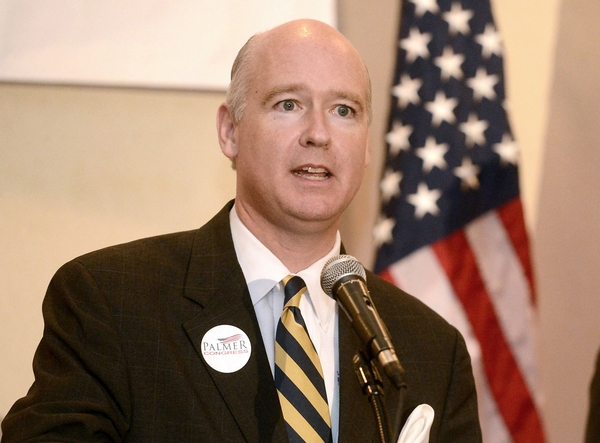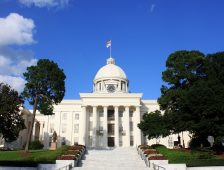By Southern Torch Staff
ALABAMA — The Alabama congressional delegation have begun to deliver their recommendations to Governor Kay Ivey's (R-Ala.) economic recovery task force.
On Tuesday, Rep. Robert Aderholt (R-Ala.) gave the following letter to the Governor with his recommendations:
Dear Governor Ivey:
Thank you for the opportunity to participate in the Getting Alabama Back 2 Work Task Force. As you well know, the purpose of the Task Force is to examine the impact of COVID-19 on the small businesses of the state and to determine the best time and method for safely reopening the economy.
As the Task Force member representing Alabama’s Fourth Congressional District, I appointed a diverse group of thirteen leaders in various fields (from medical, retail, hospitality/restaurant, banking, transportation, engineering and manufacturing) to provide input. I also sought the advice of the directors of the twenty-six Chambers of Commerce in the district. Furthermore, my staff developed a survey which was distributed to the Chambers and their individual members. Several of the Chambers also provided my office with the results of their own surveys. All total the Fourth District Task Force received just under four hundred responses to these surveys. The majority consensus (64% of respondents) is that Alabamians are prepared to return to work and that the economy should begin to be opened by May 1, 2020. The breakdown of the survey had 29% in favor of opening immediately, 35% for opening on May 1, 9% for May 15, 7% for June 1 and 20% for “other” (the majority of these were from businesses that never closed).
The responses to the surveys also provided several suggestions for the protection of their customers and employees. Some of the key points are:
- Enforce social distancing in all areas
- Limit the number of people allowed in the establishment
- Masks to be worn in public places
- Limit gatherings to 25 or less, dependent on the size of the facility and if a six-foot distance can be maintained between patrons/attendees/etc.
- Promote frequent hand washing
- Frequent cleaning/sanitizing of high traffic areas
- Limit direct contact between employees and customers
- For healthcare and dental providers, provide health screenings for patients before entering the facility
- Encourage telework where possible
- Encourage at-risk individuals to continue to shelter in place
- Prioritize rapid-result testing for workers with “symptoms” but perhaps no infection
Our task force business leader for defense and engineering manufacturing noted that many of the above principles have already been successfully utilized for five weeks in some exempt (national security) work, with no spike in coronavirus cases.
During my conference calls with the Task Force Members and the Chamber directors, a number of concerns were brought to my attention. First, it was suggested that more antibody testing is needed to determine exactly how prevalent COVID-19 is in the state. Second, a number of respondents are concerned that there will not be enough personal protective equipment (PPE) or sanitizer to meet the increased demand. Third, there are concerns that some of their employees will refuse to return to work, either because they are scared to be out in public, because of a lack of childcare or because they are making more on unemployment than when they were working. And regarding childcare, with the schools closed, daycare facilities will need to be reopened, which will be a challenge to do so safely.
In the responses we received, a dentist stated they would need clear guidance from the Alabama Board of Dental Examiners and the Alabama Dental Association on what protective procedures will be required (if any) above and beyond their current measures. This will allow them to order the appropriate PPE.
We also heard from a non-profit working with the low-income population. They are having problems obtaining documentation virtually and would like clear guidance from the Alabama Department of Human Resources (DHR) and the Alabama Department of Economic and Community Affairs (ADECA) on the acceptable means of acquiring a digital signature.
The hospital administrator on the Task Force would like for hospitals to be allowed to perform elective procedures immediately because the current restrictions have drastically reduced their income. They are also treating few, if any, COVID-19 patients. There are two hospitals in my district that are on the verge of closure and must increase their revenue to stay open.
Finally, it was suggested that the state create a program to assist small businesses who want to transition to e-commerce. They would not necessarily abandon their brick-and-mortar facility, but an online presence would allow them to generate income if they are again forced to close their facility to the public.
In conclusion, the overall message we are getting from the people of the Fourth District is that we cannot stay closed indefinitely, but at the same time, we cannot open the economy all at once. There needs to be a measured plan to open things up in phases to ensure that businesses are acting responsibly, and their customers are protected as much as possible. My recommendation is to follow the federal guidelines, which calls for a two week decline in new cases; for our hospitals to be able to operate on a non-crisis basis and a robust testing program for at-risk healthcare workers as well as antibody testing. Additionally, I feel that the state, where appropriate, should work on a regional or county basis to modify these criteria to fit the local circumstances. After all, what will work for Tuscaloosa County may not work for DeKalb County.
Thank you again for the opportunity to provide feedback from the businesses and industries of the Fourth Congressional District. I look forward to working with you to achieve our common goal of getting Alabama Back 2 Work.





